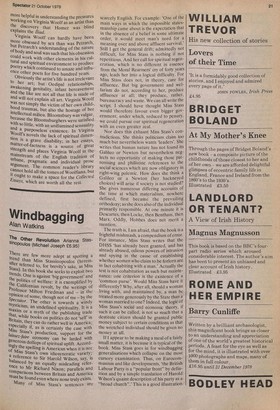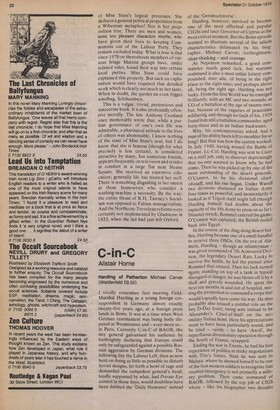Windbagging
Alan Watkins
The Other Revolution Arianna Stassinopoulos (Michael Joseph £6.95) There are few more adept at spotting a trend than Miss Stassinopoulos (hereinafter referred to, for brevity's sake, as Miss Stass). In this book she seeks to exploit two trends. One is against 'big government' and the politics of welfare: it is exemplified by the Californian revolt, by the writings of Professor Milton Friedman and — in the opinion of some, though not of me — by the Spectator. The other is towards a windy mysticism, an undefined spirituality. It is a maxim or a myth of the publishing trade that, while books on politics do not 'sell' In Britain, they can do rather well in America; especially if, as is certainly the case with Miss Stass's production, support for the laissez-faire economy can be larded with generous dollops of spiritual uplift. Accord-. mgly the spelling is American when it is not. of Miss Stass's own idiosyncratic variety. a reference to Sir Harold Wilson, say, is balanced by an equally misleading reference to Mr Richard Nixon; parallels and comparisons between Britain and America must be found even where none truly exists. Many of Miss Stass's sentences arc scarcely English. For example: 'One of the main ways in which the impossible statesmanship came about is the expectation that in the absence of a belief in some ultimate order, it would meet man's need for a meaning over and above affluent survival.' Still I get the general drift; admittedly not difficult, for Miss Stass is nothing if not repetitious. And her call for spiritual regeneration, which is no different in essence from the Moral Rearmers' cry of forty years ago, leads her into a logical difficulty. For Miss Stass does not, in theory, care for affluence. But big government and welfarism do not, according to her, produce affluence at all: they produce, rather, bureaucracy and waste. We can all write the script. I should have thought Miss Stass would therefore favour even bigger government, under which, reduced to penury, we could pursue our spiritual regeneration with an even greater zeal.
Nor does this exhaust Miss Stass's contradictions. She thinks politicians claim too much but nevertheless wants 'leaders'. She writes that human nature has not found its Galileo or Newton but nevertheless neglects no opportunity of making those patronising and philistine references to the social sciences which are now obligatory in right-wing polemic. How does she think a Galileo or a Newton (her hackneyed choices) will arise if society is not studied? She gives numerous differing accounts of the time at which materialism, nowhere defined, first became the prevailing orthodoxy; as she does also of the individual primarily responsible. At one minute it is Descartes, then Locke, then Bentham, then Marx. Oddly, Hobbes does not merit a mention.
The truth is, I am afraid, that the book is a frightful mishmash, a compendium of error. For instance, Miss Stass writes that the DHSS 'has already been granted, and has already abused, odious powers of intrusion and spying in the cause of establishing whether women who claim to be forlorn are in fact cohabiting with a man.' Actually the test is not cohabitation as such but maintenance: one criterion is the existence of a 'common purse'. Would Miss Stass have it differently? Why, after all, should a woman living with, and maintained by, a man be treated more generously by the State than a woman married to one? Indeed, the logic of Miss Stass's social and economic theory, if such it can be called, is not so much that a destitute citizen should be granted public money subject to certain conditions as that the wretched individual should be given no money at all. If! appear to be making a meal of a fairly small matter, it is because it is typical of the book. Miss Stass goes in for windbagging, generalisations which collapse on the most cursory examination. Thus, on Eurocommunism and like developments, 'the British Labour Party is a "popular front" by definition and by a simple translation of Harold. Wilson's quaint description of his party as a, "broad church".' This is a good illustration of Miss Stass's logical processes. She deduces a general political proposition from a Wilsonian metaphor! Nor is her proposition true. There are men and women, none too pleasant characters maybe, who have given their lives to keeping Communists out of the Labour Party. They remain excluded today. What is true is that since 1970 or thereabouts members of various fringe Marxist groups have, under relaxed rules, found their way into certain local parties. Miss Stass could have explained this properly. But such an explanation would have required that detailed work which is clearly not much to her taste. When in doubt, she quotes an even bigger windbag, Solzhenitsyn.
This is a vulgar, trivial, pretentious and inaccurate book. It is also profoundly offensive morally. The late Anthony Crosland once memorably wrote that, while a puritan governance of one's own life was admirable, a pharisaical attitude to the lives of others was abominable. I know nothing of the state of Miss Stass's soul, but I do know that she is famous (though for what precisely is less certain), is considered attractive by many, has numerous friends, appears frequently on television and resides in comfort in a large flat near Sloane Square. She received an expensive education; generally life has treated her well. There is something disgusting in her sneers at those housewives who consider a washing-machine a necessity. By the way: the entire thrust of R.H. Tawney's Socialism was opposed to Fabian managerialism. And the Northcote-Trevelyan reforms were certainly not implemented by Gladstone in 1833, when the lad had just left Oxford.







































 Previous page
Previous page